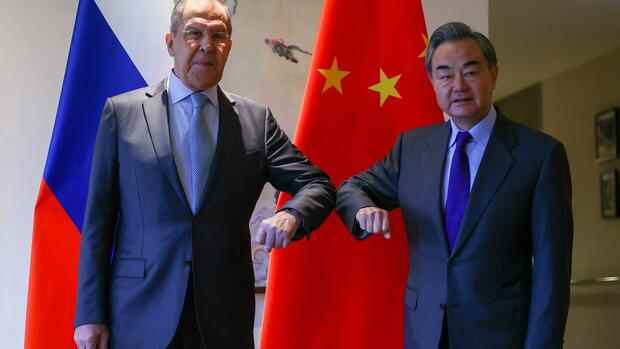The foreign ministers of Russia and China reaffirm their foreign policy partnership.
(Photo: imago images/ITAR-TASS)
Beijing China maintains its “borderless” partnership with Russia. Despite growing international pressure after the Russian invasion of Ukraine, China’s Foreign Minister Wang Yi pledged support to his Russian counterpart Sergey Lavrov. Sino-Russian relations are on the right track and have shown resilient development momentum, Wang is quoted as saying.
It was the first face-to-face meeting between the two foreign ministers since the Russian invasion of Ukraine.
Both sides reaffirmed their will to expand bilateral relations, as agreed by heads of state Xi Jinping and Vladimir Putin. At their meeting in Beijing on February 4, the Chinese and Russian heads of state assured each other of their “boundless” friendship and concluded extensive bilateral agreements. 20 days later, Russia launched its war of aggression against Ukraine.
The talks between Lavrov and Wang came ahead of a two-day Afghanistan summit in the southeast Chinese city of Tunxi.
Top jobs of the day
Find the best jobs now and
be notified by email.
At the invitation of China, the development of Afghanistan will be discussed. The meeting will also be attended by representatives of the USA, neighboring countries and the Taliban regime that has been in power since August.
In the Ukraine war, the Chinese government describes itself as neutral, but in fact it supports Moscow’s positions on most points: It rejects NATO’s eastward expansion, accuses the USA of stoking tensions, speaks of Russia’s “legitimate security concerns” and condemns them western sanctions as illegal. It also refuses to identify the Russian invasion as such and avoids speaking of a war.
>>Read also: War in Ukraine: West should judge China by its actions
The official statement from China’s Foreign Ministry reiterated that the “Ukraine issue has a complex history and context and is the result of a long-standing European security conflict and Cold War mentality.” In the current situation, China supports Russia and Ukraine “in overcoming the difficulties and continuing the peace talks”.
Nothing was revealed about possible Russian requests for military or economic support from China in the talks. Two weeks ago, US President Joe Biden personally warned Chinese head of state and party leader Xi Jinping against material support for Russia in the war against Ukraine in a video link and threatened the consequences.
China and Russia want to expand partnership
According to a statement by the Russian Foreign Ministry, both countries want to coordinate their foreign policy more closely and present a common position in international affairs. “We will move together with them and other like-minded people towards a multipolar, just and democratic world order,” Lavrov said, according to the Russian news agency TASS.
At the Foreign Ministry’s daily press briefing, spokesman Wang Wenbin said China has always emphasized that dialogue and negotiations are the only right way to resolve the crisis in Ukraine. He called on the international community to do more for the peace process.
Many observers see China as a potential mediator that could exert a moderating influence on the Russian president. However, there are doubts that the Chinese government wants to play this role.
Experts: Beijing wants Moscow as a junior partner
The economist Alicia García Herrero estimates that the government in Beijing has no interest in a change of power in Moscow. In no case does Xi want a Western, democratic Russia. “China wants Putin to stay,” says the chief economist at French investment bank Natixis for the Asia-Pacific region.
In this way, the People’s Republic could secure access to Russia’s cheap raw materials. Beijing wants a Russia that is dependent on China, but is not weakened too much.
The Chinese leadership needs Russia as a partner who “supports China’s position in a bipolar world order,” emphasizes Markus Taube, Professor of East Asian Economics at the University of Duisburg-Essen.
More: Supporter, sufferer, profiteer? – What China’s pact with Putin means for Europe.
